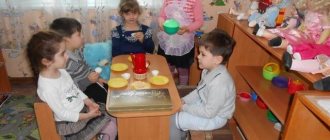Recommendations for parents
It is difficult for a small “producer” to come up with an interesting plot in the first stages. He has not yet sufficiently mastered the world in which adults live. During this period, it is necessary to help the baby, show how and what to play. The variety of plots, their duration and emotional intensity will depend on the parents’ imagination. When organizing entertainment for adults, you need to follow several rules:
- Don't force. If the child is not in the mood or he was simply planning to put together a picture from puzzles, there is no need to start building a spaceship. First you need to ask whether the baby wants to do this and only after receiving consent can he begin to take active action. At the first sign of loss of interest, it is better to stop the activity.
- Don't force yourself into rigid boundaries. Let the child show his imagination and contribute to the development of the plot.
- Create a friendly atmosphere. Leave aside the strict intonations, irritation and authoritarian manners; they are completely unnecessary here. Play on equal terms, or better yet take on secondary characters: a patient in a clinic, a disheveled model in a hairdresser; incompetent road user. Guide your child’s actions slowly, gradually, so that he doesn’t feel it.
Role-playing activities not only entertain, but are also an element of the educational process that allows you to understand the laws by which people live. In addition, they instill in the younger generation communication skills and help them become independent individuals, ready to overcome any adversity in life. More interesting information about toys and children's development can be read on our blog.
Levels of role-playing play: from 3 to 7 years
The main indicator of the development of the game is its sequence: the beginning of the process, the culmination and the logical conclusion. Observing children during activities helps adults notice behavioral deviations at an early age and make efforts to eliminate them. Child psychologists find a relationship between the child’s age, his level of development and the complexity of play activities:
- 3-4 years. Mostly kids play with adults, whose help at this stage is quite significant. Parents come up with a plot, hold an imaginary situation, guide the children and provide guidance. Children often try to play on their own, but such activities are usually short-term and limited to a couple of actions: wash the dishes, put the doll to bed, feed the teddy bear. The plot does not unfold further - no one eats, no one praises them for clean plates, and no one wakes up. At this stage, the game should teach children to act according to the script, develop imagination and enrich their vocabulary.
- 4-5 years. From this age, children begin to master simple plot directions in which they try on various images: a mother, a sister, or a doctor from a children's clinic. They actively interact with toys, talking for themselves and for them. At this age, children can already join groups (2-3 people) for joint activities. The company helps 4-5 year old players develop communication skills, teaches how to conduct a dialogue, independently distribute responsibilities and select toys.
- 5-6 years. The main focus of the game is the relationships between people, whose roles the children distribute among themselves. Toys are selected to match the invented scenario. The everyday theme is complemented by work activities and significant events in life. Must be consistent with the character and actions of the assigned role. While playing, the child develops the ability to determine the rules and change the plot, activates dialogical speech, enriches his social experience (learns the rules of behavior on the road, in transport, cafes, shops, etc.)
- 6-7 years. At this stage, children act meaningfully, aware of their relationships with partners. While playing out scenes, they jealously monitor their friends’ compliance with generally accepted rules: “Dads don’t act like that,” “Dinner doesn’t start with the second course,” “Girls don’t behave like that”—such phrases are often heard in the company of older preschool-age children. Creative role-playing games with exciting plots, content, new characters, and a fairy-tale world come to the fore. The children themselves prepare the scenery and attributes, select toys, and add elements of dance and singing to the scenes.
Play is the leading activity of a preschooler and occupies an important place in his life. Children are transported from everyday routine to an imaginary situation, try on interesting roles, use images and imagination to act in the play space. At this time, adults receive in their hands a powerful tool for influencing the child’s future inclinations, his actions and character. You can read about the benefits of wooden toys in the article “Wooden educational toys: features and benefits for children.”
Role-playing games for children 4-5 years old
At this age, it is important for children to choose the role that they like best. Dialogues with other participants, through which information and emotions are exchanged, are important in the process. Preschoolers are able to come up with a coherent plot with the development of events, and distribute roles between the participants. They enjoy fantasizing and coming up with interesting stories.
Suitable games for preschoolers:
- "Circus";
- "In Space";
- "In the restaurant";
- "Journey to Another Continent";
- "ONE HUNDRED";
- "Airplane";
- "On the ship", and much more.
What moms say
Maria, mother of four-year-old Dasha: “My daughter loves to play with dolls. We come up with different stories: the mother goes for a walk with the child, feeds the baby, bathes, and changes clothes. It’s so touching to watch how Dasha feeds the baby doll porridge in the morning and sits him in a toy chair. Then he rolls along the street in a stroller, bathes him in a toy bubble bath in the evening, and wraps him in a towel. I believe that such games prepare children for later life, because one day Dashenka will raise her own child.”
Olga, mother of five-year-old Miroslav: “Friends often come to visit my son, and they play construction together: they build buildings from blocks or construction sets. They often play hospital, where one of the children becomes a doctor, and the rest voice the toys who are sick and need help.
I know that role-playing games are important for children’s development, so I come up with interesting stories myself. For example, we recently staged a theatrical performance: we wrote a script, seated teddy bears on chairs, and turned on music. Miroslav really enjoyed performing “on stage.”
Parents should remember that role-playing games are important in the development of intelligence, as well as communication and creative skills in children.
It is necessary to encourage in every possible way the child’s desire to play “Daughters-Mothers” or “Hospital”, as well as come up with new storylines in which the child can learn something new. leave a comment
Why do preschoolers need games?
In the first 5-6 years, a child studies everything that surrounds him, gets acquainted with new phenomena, and forms his own opinion. It is at this time that habits and skills are formed, which in the future will be the basis of character. Thanks to games, children learn a lot of new things, draw their own conclusions, learn to communicate, and expand their horizons and worldview. Role-playing games that help to master communication skills are important. The child learns to communicate with other children, express his point of view, and transform into a person of a certain profession or social status.
What are the benefits of role-playing games:
- The child's personality develops.
- Cognitive processes are activated.
- Kids try on various social roles.
- Children learn to interact with other players.
- The child must follow certain rules of the game.
- Self-discipline develops.
- Creative potential is being developed.
- Games help intellectual development.
- The speech apparatus improves.






